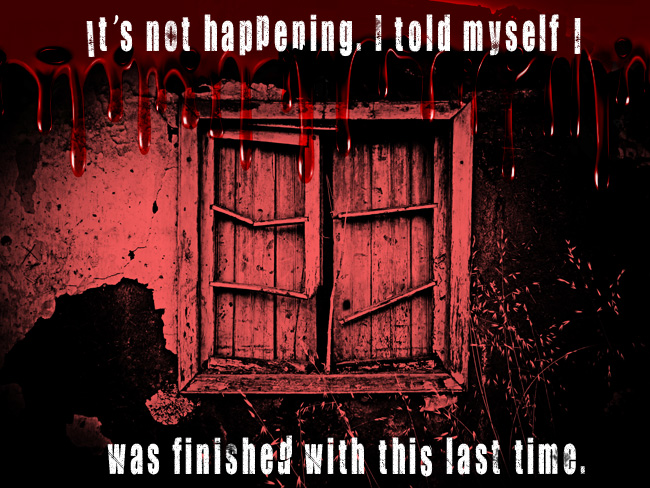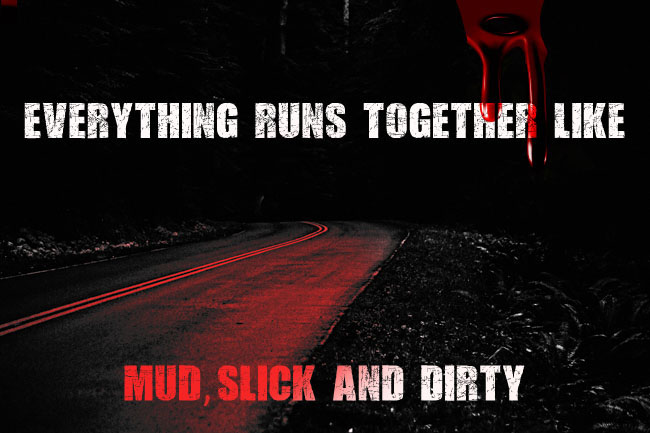Shantallow | Chapter One
I don’t do this anymore. I don’t cut left onto Bridge Road and follow it past Holy Trinity High School, where the trees are shuddering together in the wind, a sign proclaiming “WELCOME BACK STAFF AND STUDENTS” squatting malevolently in front of them. I don’t swing a right into Newtown Creek, one of the more exclusive areas of Tealing, tapping my fingers impatiently against the wheel as I cruise by grass as green as a golf course but as stern and precise as a Marine’s crewcut. My heart isn’t thumping erratically, like a kid making sure his feet don’t hang over the bed so the thing that lives underneath won’t grab them, while houses with porches only slightly smaller than the apartment I lived in four years ago flash by my windows.
It’s not happening. I told myself I was finished with this last time. The last thing I need is to look like a stalker. I’m more like a ghost haunting the last site of my happiness. Although maybe that’s being a stalker too.
Meanwhile, the sky overhead is a ceiling of unbroken black, moonless and starless, the same as if there were nothing up there. But I know better. I know that when the cloud cover breaks, the stars will twinkle with ostentatious brightness, appearing three times as plentiful as they do on my street in Balsam, where the street lamps follow the townhouses’ example of crowding near to each other. Memories of the glittering Newtown Creek sky — and other useless things — close in on me while I approach the Mahajan house, the sick feeling in my stomach creeping up my throat in slow motion as I take my foot off the gas.
My neck swivels to the right, my gaze darting beyond the cobble stone post with the address “288 Margate Avenue” etched neatly into it, to focus on the Mahajans’ wide, shapely driveway. A single car is parked on the far left, under a maple tree — a muddy white Kia Rio that I spotted occupying the same space about five weeks ago. Mr. Mahajan drives a silver Nissan Infiniti, and only last November Mrs. Mahajan bought an electric blue Impala to replace her five-year-old Passat. Tanvi doesn’t care what kind of car she drives, but her parents gave her a Subaru Legacy because it had a driver death rate of zero on a highway safety study.
Obviously the Kia doesn’t belong to any of them. It’s not necessarily relevant either.
But then again, maybe it is.
I don’t stop. I step on the gas again, zooming by the house as though I have another destination in mind.
The tall trees of Newtown Creek are swaying anxiously around me, shrubbery and the occupants of flower beds shaking with such force that they look like they’d appreciate a coat or a blanket. Ultimately either would only blow away because the wind’s picking up steam as I leave the Mahajan house in my wake.
I was never here tonight. No one knows any different.
When things go bad you’re supposed to walk away from them and stay away. It’s survival instinct.
You don’t poke around in the mess, dragging your hands through it like a four-year-old with finger paint. You don’t stomp through it, getting it on your shoes and trailing it around after you, leaving permanent stains.
It really shouldn’t matter who the white Kia belongs to. I’m gone.
My shoulders loosen as the Mahajan house shrinks in my rear-view mirror, and then disappears altogether when I hang a left and start working my way back to the main road. The detour has cost me less than ten minutes. I’m good.
Suddenly a lightning bolt zigzags through the sky off to the east,. so quick that I can’t be sure whether it really happened or I imagined it. My windshield is dry, but now I’m anticipating raindrops, looking at the trees’ sinister dance while my mind reaches for a familiar shadowy feeling that’s suspiciously like the sensation of falling. A slippery unease as chilly as an ice cube tickles the small of my back, my body jolting into high alert mode. My spine and neck tingle like I’m out of place, backwards in time without remembering the specifics, only that I’ve been exactly here and now before.
They say that young people have déjà vu more than older ones, that the experiences steadily decrease after age twenty-five. But in this case the sensation could also have something to do with barometric pressure — blood vessels in my head expanding or contracting to compensate for changing oxygen levels.
It’s going to storm. It’s only a question of when.
Another possible, and more likely, explanation, is that anything to do with Tanvi knocks me sideways so that I’m scrambling to regain my balance, waves of regret lining even the best memories. The secrets that I’ll never tell anyone because they’re ours alone. The times we were the quietest because there was no need to speak. The sweet candy -smell of her skin. Tanvi’s fingers threading softly through my hair, over and over just the way I liked. The fucked- up arguments. Her fuzzy green Christmas socks with the matching reindeer on them. Tanvi’s voice on the phone the first few times she said my name, like I was somebody else. Somebody better.
The things I did. The shitty, shitty, unforgivable things.
Everything runs together like mud, slick and dirty.
I choke out a cough, clearing my throat when what I really need to clear is my head. Empty Tanvi out and start over.
But what do I do instead? As usual, the wrong thing. I swerve into a stranger’s driveway — the basketball net in front of the garage jerking around like a kite about to take flight — and begin doubling back to Margate Avenue. Thunder booms in the distance, and my heart drums faster in response: tick-tick-tick-TICK-tick-TICK-tick-TICK-TICK-TICK. There’s a race on that it means to win, and my esophagus tightens, wanting no part of it.
There’s nothing wrong about a storm; it’s just doing what it does naturally. The sky blazes a second time, and this one I witness full on — a spider vein of electricity that doesn’t care what it topples or who it destroys.
None of this has happened before. My body and mind both understand that now. This is fresh paint, unwritten and urgent.
The hairs on the back of my hands prickle, and the stars, they keep right on hiding. That piece-of-shit- looking white Kia. Whose is it? Parked confidently in the Mahajans’ stately driveway at eleven-twenty on a Thursday night like it has every right to be there.
My mind gallops through the car makes and colours belonging to each of Tanvi’s circle and comes up blank, same as it did the first time I saw the Kia. It was earlier in the day then; it could’ve belonged to anyone. A pizza delivery person or a contractor.
I clamp my mouth shut and breathe in through my nose, the itch under my skin screaming at me, urging me on the rabid way some parents cheer for their kids at soccer and hockey games — the mothers and fathers who don’t know when to sit down and shut up because they’re not helping.
And I do know, but I don’t stop either, so I’m not any better than they are. But it doesn’t matter anyway; I’ve got the car crawling toward the Mahajan house and I’m taking in the scene. A long white utility van has joined the Kia in the driveway. If the driver had positioned it any closer to the front door the van would actually be inside the house’s sheltered entranceway, and a laugh spurts from between my lips, forcing my mouth open.
It was contractors after all. Not somebody else Tanvi was going to wear her killer mini-dress for. Not someone she’d lie on the Mahajans’ sectional couch with, her hand swimming through his hair.
I’m not directly in front of the Mahajan house yet — I’m two doors down, moving at a snail’s gait — when someone dressed in black steps into the unlit gap between the entranceway and the back of the utility van. The Mahajans don’t have a porch like many of their neighbours do, only that covered square of doorstep — three gentle steps leading up to it — which means you could hang around outside their door in the pouring rain for hours and remain bone-dry.
I kill my engine and lights the second I spot the guy. He’s opening the van’s rear double doors, a second figure in black joining him. They must be preparing to haul something from the house into the van, trying to make their job as easy as possible. From my position on the road I can’t see much — there’s a fair bit of lawn between the house and the street, and the gap between house and van is small — but then there’s a flash of something decisive, a moment that catches in my lungs.
A black ski mask. One of them is wearing the kind of ski mask you see on closed- circuit security footage of bank and store robberies, the eyes and mouth cut -out from the fabric. My stomach plummets, my mind rushing maze-like through the images in front of me, trying to make sense of them. The hanging lantern that should illuminate the entryway is dark. Why would you have the light off if you were planning to carry something out to the van?
You wouldn’t. A gaggle of arms and legs of assorted skin tones — people being hustled out of the house — zooms into the gap along with more men in ski masks. One of the group is only a kid, her body twisting and arms and legs flailing, slapping and kicking at black-clad body parts. A cry slices the air, and I don’t know how long I’ve been sitting and watching from my car, but I’ve seen enough. My left hand closes around the door handle, forcing it down and throwing the door open.
Usually I’m better at long- distance running than sprinting, but not tonight. One second my running shoes are hitting pavement and the next I’m hurling myself into the nearest figure in black, my fist jabbing into the stranger’s neck. A drop from the clouds spits on my chin. The van doors are gaping open behind me — rear windows ominously whited-out — and a male voice shouts something that I don’t have time to decipher.
A second guy lurches forward and punches me square in the nose. Cartilage crunches, my knees starting to buckle as my eyes swim. “Fuck,” someone’s muttering. “Who the fuck is this asshole?”
I spin to stare into the back of the van — at Tanvi sitting on the floor between two other people not in black who I can hardly make out because my pupils are drowning. My head down low, I charge into the nearest inky target, grabbing him around the middle and toppling him to the ground.
I go with him, my fall broken by his body.
I go with him, my fall broken by his body.
Someone yanks up my feet and somebody else grabs roughly at my shoulders, wrangling me into the air. No. No. Get the fuck off me. Desperation blends with fury in my limbs. My fingers drive into fabric, then skin. I fling my arms around the waist of the figure underneath me, chafing the back of my hands against the cement and kicking behind me with all my strength. The sky crackles, sudden light blinding me while rain pummels my skin and my bloody nose weeps like a bathroom tap. People are shouting and screeching chaos, my head spinning and my bones howling. Something hard jabs against my head.
The blood from my nose drips into my eyes, my body slanted with my feet up and head down. I can’t see anything but stinging, soupy red. I don’t know what’s happening. Only that Tanvi’s in the back of the van and she shouldn’t be there. The guy on the ground is struggling out from underneath me, but I’m still holding on, cold dread spreading inside me — the moment freezing.
The moment just before they do whatever they were going to do in the first place, and I can’t stop it. She’s gone.
“I think he saw my face,” someone barks.
Then Tanvi’s voice sails above the anarchy, thawing the action. “Don’t shoot him. You can …” The sound dies in my ears as my right cheek bursts, head slammed violently to the side by nothing I see coming, a twin punch bulldozing simultaneously into my abdomen, dragging me feet first into total darkness.












